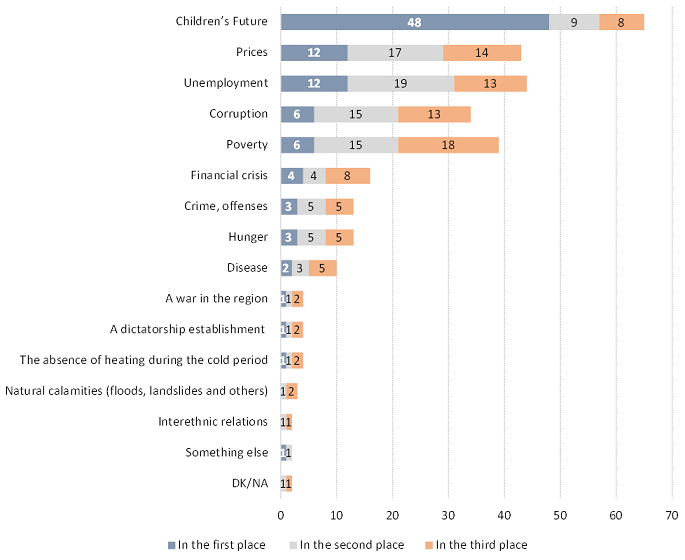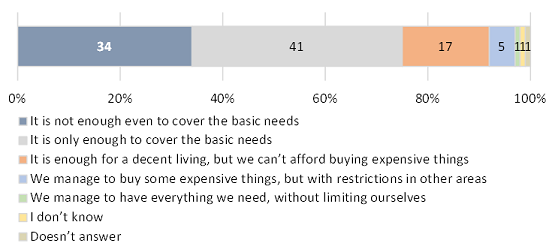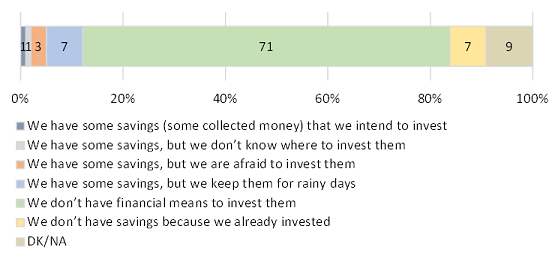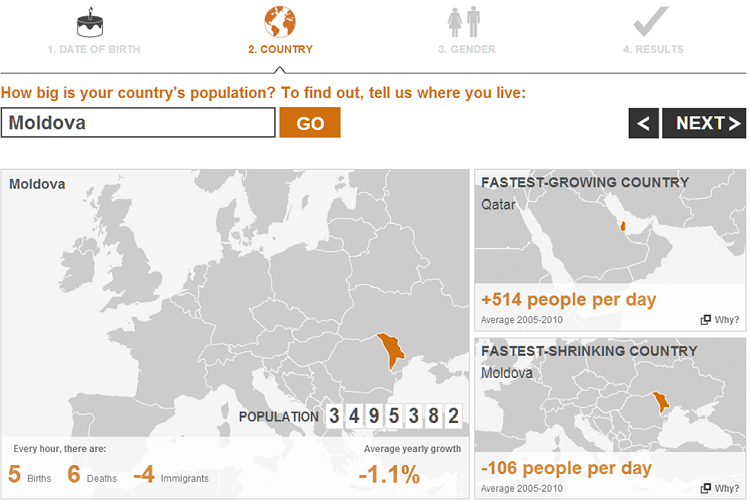You already know Ion and Maria *. Her husband recently went to work abroad. The money received from their salaries were only enough for their survival. Nevertheless, they want to have their own house, a reequipped car or, better yet, a new one. They have one more desire. To be able to go on vacation at least once in a year. In Turkey.
Maria has dreams for her child- to become as one of their distant acquaintances. He has more than one business, both in the country and abroad; a large house and a garden with flowers in the town, an expensive car, and he travels anywhere in the world he wants.
Maria and Ion are most afraid of getting old. Maria considers her mother, who is retired, to be lucky compared to those from the city. She lives in her country home; she receives flour, oil, and corn for the birds, on the account of the leased land. She is also growing something in her garden. The pension being spent on utilities.
Moldova is labeled and remains "the poorest country in Europe" even if the nominal GDP per capita estimated by the IMF in 2012 rose to $ 2,037. All international news about our country start with this headline, this is what we repeat ourselves as well. However, how is the poverty seen at home?
When we say poor, we think of starving to death. A man who has no money for basic necessities, and whose main concern is food. In 2009, a UN report estimated that 11.5% of our population is below the international poverty with $ 2.25 available per day.
The main concern, however, is not eating, but the children's future (47%). This indicates Magenta Consulting's survey conducted in collaboration with IPP. Secondly, we fear to remain unemployed, with 19% who indicated that unemployment is their secondary concern. Placed only the third, with 18%, is the fear of poverty. 3% fear the famine more than anything else. The last two dangers are most disturbing for people living in the country, who have a low-income and are over the age of 60 years, so, retirees and respondents with low or medium level of education.
Table What are the things that worry you most today? %

For food, we have, but we cannot say that there is no money shortage. 34% said there were not enough money to ensure a minimum living. 64% still live better - 41% have money for their basic needs, 17% have a normal life, but cannot afford expensive things, 5% take something a little more expensive, but only if they give up something else and only 1% have what they need, without limitation.
Table Which of the following statements best suits your family status?

No money - no savings. 71% of respondents said that they had no money to put aside. If they have something, they keep them for rainy days, are afraid or do not know how to invest them.
How would you appreciate your family's current income?

Money do not buy happiness, but they sure cause dissatisfaction towards life. 52% of respondents declared they were not very and not at all satisfied with the life they have. On their background, 42% see their life as a pretty good one, and 2% are very happy with everything they have.
Still, to which category do we belong to- princes or beggars? Magenta Consulting's Research, with new added criteria, established for Moldova five classes:
Resistance class (60%) - up to 1500 MDL / month
are - pensioners, farmers, suppliers of unskilled work
survive - from the low salary, pension or land work
home - received from the state and privatized it, have built it in the village or are living with parents
car - usually not
holiday destinations - occasionally, Ukraine
They fear of poverty and hunger. Do not have savings or just for rainy days. Declare themselves dissatisfied with life.
Social class (30%) - from 1500 MDL / month up to 5000
are - semiskilled to qualified labor providers, with average or higher studies
live and last - of salary
home - rent, or in case of some savings, purchased through mortgage
car - usually tend to buy equipped ones
holiday destinations - Ukraine, Romania or low-cost destinations once a year
They fear unemployment, and that they will not find a better-paid job. Cannot afford to save and buy things that are more expensive unless they waived others. Tend to hope for a better life in the future.
The middle class (7%) - from 5000 MDL / month and more
are - skilled labor providers, small and medium business owners
have a decent life - from salary or business income
home - they purchased through mortgage or paid in full
Machines - often new, bought in leasing or paid in full
holiday destinations - Turkey, Bulgaria, Romania, once or twice a year
Worry more for children's future and fear of unemployment. Savers, but they invest in the house, car or other expensive items. Tend to be satisfied with life.
luxury class - from ....
are - big business owners, in the country and abroad
have a secured life with everything they want - from their business
house - one or more, large and spacious, in elite areas
car - one or more, luxurious, or from a collection
holiday destinations - any country in the world, several times a year
They have other worries than unemployment, poverty and hunger. Typically, they are concerned about the businesses welfare, the situation in the country and the power of influence. They invest their savings to diversify and secure their financial situation. Tend to be satisfied with life.
Meanwhile, Magenta Consulting identified the fourth social class- those working abroad. The World Bank has estimated that 40% of the working population in Moldova is working abroad, providing 30% of the GDP. Also because of the mass emigration, in relation to the number of births and deaths, Moldova has been described as the country with "the fastest decline" with -106 people per day.
SCREENSHOT FROM http://www.bbc.co.uk/news/world-15391515

So, the emigrants class - from 6000 euro / month or more (depending on the country they leave to)
are - people of working age, which provide skilled or unskilled labor. Most of the time, from the resistance or social class.
ensure a decent living for those back home - the salary received abroad
home - have or tend to buy
machine - have or tend to buy
holiday destinations - come home or invite their family and travel in the country they are working in
The fear of unemployment in the country they are working in, and worry for their children's future. Make savings that they further invest in their children's education, real estate, and rarely, in business. Tend to be dissatisfied with the living standard that is back at home.
___________________________________________________________________
This article was produced based on the data from the study "Public Opinion Barometer," issued in April 2013, conducted by Magenta Consulting in collaboration with the Public Policy Institute, and on Magenta's individual researches and conclusions. The research was conducted on a sample of 1,100 respondents from 80 localities, with a margin of error of ± 2.8% at a confidence interval of 95%.
* Ion and Maria are fictional characters created based on the data that are representative for Magenta Consulting's researches.
Other sources:
http://www.bbc.co.uk/news/world-15391515
http://www.euro.who.int/en/where-we-work/member-states/republic-of-moldova/facts-and-figures
http://www.euro.who.int/en/where-we-work/member-states/republic-of-moldova/facts-and-figures